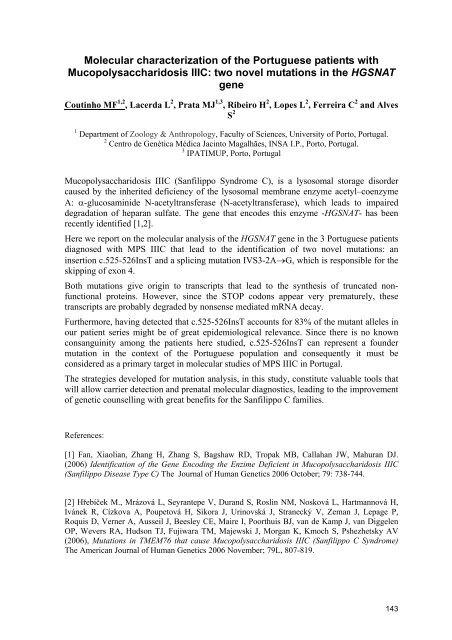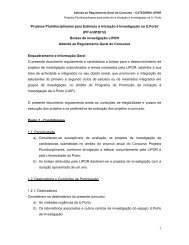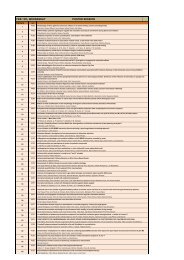IJUP08 - Universidade do Porto
IJUP08 - Universidade do Porto
IJUP08 - Universidade do Porto
- TAGS
- universidade
- porto
- ijup.up.pt
You also want an ePaper? Increase the reach of your titles
YUMPU automatically turns print PDFs into web optimized ePapers that Google loves.
Molecular characterization of the Portuguese patients with<br />
Mucopolysacchari<strong>do</strong>sis IIIC: two novel mutations in the HGSNAT<br />
gene<br />
Coutinho MF 1,2 , Lacerda L 2 , Prata MJ 1,3 , Ribeiro H 2 , Lopes L 2 , Ferreira C 2 and Alves<br />
S 2<br />
1 Department of Zoology & Anthropology, Faculty of Sciences, University of <strong>Porto</strong>, Portugal.<br />
2 Centro de Genética Médica Jacinto Magalhães, INSA I.P., <strong>Porto</strong>, Portugal.<br />
3 IPATIMUP, <strong>Porto</strong>, Portugal<br />
Mucopolysacchari<strong>do</strong>sis IIIC (Sanfilippo Syndrome C), is a lysosomal storage disorder<br />
caused by the inherited deficiency of the lysosomal membrane enzyme acetyl–coenzyme<br />
A: α-glucosaminide N-acetyltransferase (N-acetyltransferase), which leads to impaired<br />
degradation of heparan sulfate. The gene that encodes this enzyme -HGSNAT- has been<br />
recently identified [1,2].<br />
Here we report on the molecular analysis of the HGSNAT gene in the 3 Portuguese patients<br />
diagnosed with MPS IIIC that lead to the identification of two novel mutations: an<br />
insertion c.525-526InsT and a splicing mutation IVS3-2A→G, which is responsible for the<br />
skipping of exon 4.<br />
Both mutations give origin to transcripts that lead to the synthesis of truncated nonfunctional<br />
proteins. However, since the STOP co<strong>do</strong>ns appear very prematurely, these<br />
transcripts are probably degraded by nonsense mediated mRNA decay.<br />
Furthermore, having detected that c.525-526InsT accounts for 83% of the mutant alleles in<br />
our patient series might be of great epidemiological relevance. Since there is no known<br />
consanguinity among the patients here studied, c.525-526InsT can represent a founder<br />
mutation in the context of the Portuguese population and consequently it must be<br />
considered as a primary target in molecular studies of MPS IIIC in Portugal.<br />
The strategies developed for mutation analysis, in this study, constitute valuable tools that<br />
will allow carrier detection and prenatal molecular diagnostics, leading to the improvement<br />
of genetic counselling with great benefits for the Sanfilippo C families.<br />
References:<br />
[1] Fan, Xiaolian, Zhang H, Zhang S, Bagshaw RD, Tropak MB, Callahan JW, Mahuran DJ.<br />
(2006) Identification of the Gene Encoding the Enzime Deficient in Mucopolysacchari<strong>do</strong>sis IIIC<br />
(Sanfilippo Disease Type C) The Journal of Human Genetics 2006 October; 79: 738-744.<br />
[2] Hřebíček M., Mrázová L, Seyrantepe V, Durand S, Roslin NM, Nosková L, Hartmannová H,<br />
Ivánek R, Cízkova A, Poupetová H, Sikora J, Urinovská J, Stranecký V, Zeman J, Lepage P,<br />
Roquis D, Verner A, Ausseil J, Beesley CE, Maire I, Poorthuis BJ, van de Kamp J, van Diggelen<br />
OP, Wevers RA, Hudson TJ, Fujiwara TM, Majewski J, Morgan K, Kmoch S, Pshezhetsky AV<br />
(2006), Mutations in TMEM76 that cause Mucopolysacchari<strong>do</strong>sis IIIC (Sanfilippo C Syndrome)<br />
The American Journal of Human Genetics 2006 November; 79L, 807-819.<br />
143










